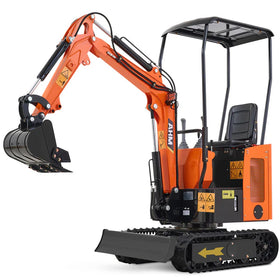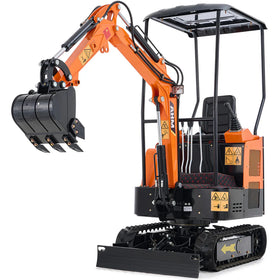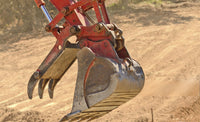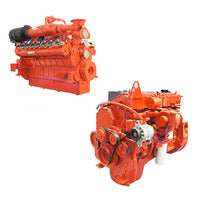If you're considering buying or renting a 1-ton mini excavator, you probably have one main question: "What can this machine actually do for me?"
I had the same question before investing in one for my property. After researching extensively and using one for various projects, I'm sharing exactly what these compact powerhouses can handle - and what they can't.
What Makes a 1-Ton Mini Excavator Different

A 1-ton mini excavator packs surprising power into a compact frame.
These machines weigh around 2,000 pounds and can dig up to 6 feet deep - perfect for most residential projects.
They're small enough to fit through standard garden gates but strong enough to handle serious digging. This mix of small size and good power makes them perfect for homeowners and small contractors who need to dig without the trouble of big machines.
AHM 1 ton Mini Excavator Specifications
|
Model |
AX-12B |
AX-15 |
AX-16 |
|
Weight |
2,138 lbs |
2,227 lbs |
2,600+ lbs |
|
Engine |
13.5 HP B&S |
13.8 HP Kubota |
23 HP B&S |
|
Digging Depth |
69 in (5.75 ft) |
69 in (5.75 ft) |
71 in (5.9 ft) |
|
Digging Force |
2,585 lbf |
2,698 lbf |
3,262 lbf |
|
Width |
37 in (3'1") |
37 in (3'1") |
39 in (3'3") |
Common Digging Projects for 1-Ton Mini Excavators
A 1-ton mini excavator shines at digging projects that would be exhausting or impossible by hand. With a digging depth of 5-6 feet and a reach of about 10 feet, these mini diggers handle most residential projects with ease.
Perfect projects include:
- Water line trenches (3-4 feet deep)
- Electrical conduit paths (18-24 inches deep)
- Fence post holes that stay sturdy for years
- Small footings for sheds or decks
- Irrigation systems for better lawn coverage
You can reach about 10 feet from where you park the machine. This lets you work along fences or house foundations without moving a lot, which saves you hours.
What Soil Types Can It Handle?
These compact machines work well in most common soil types:
- Topsoil and loam - cuts through like butter
- Clay soil - handles well with proper technique
- Sandy soil - quick and efficient digging
- Soil with small rocks - still makes good progress
But they do have limits. You'll face challenges with:
- Hard-packed gravel that's been settled for years
- Very rocky soil with large stones
- Frozen winter ground
- Tree roots thicker than 4 inches
Further reading: how break tough soil with a mini excavator
What Can 1 ton Excavator Do Beyond Digging

What surprised me most about my 1-ton excavator was its versatility beyond just digging holes:
1. Landscape Grading
With the right technique, these machines excel at:
- Creating drainage slopes away from foundations (critical for preventing water damage)
- Leveling areas for patios, sheds, or garden beds
- Backfilling foundation walls evenly
- Spreading topsoil or gravel
The blade on the front also works well for final grading passes. For best results, overlap your bucket passes by about 1/3 of the bucket width to prevent ridges.
2. Material Handling
Most 1-ton excavators can lift around 200-300 pounds, which is perfect for:
- Placing landscape boulders
- Moving heavy logs or debris
- Loading material into trailers or wheelbarrows
- Positioning heavy items like step stones or small concrete blocks
I used mine to place several 200+ pound boulders around a fire pit - a job that would have required 3-4 people otherwise.
3. Demolition Work
With the right attachments, you can:
- Break up small concrete slabs (with a hydraulic hammer)
- Remove old stumps (much easier than stump grinders for most sizes)
- Tear out unwanted landscaping
- Remove small structures like sheds or playsets
4. Property Maintenance
These machines are surprisingly useful for regular maintenance:
- Cleaning out drainage ditches
- Managing erosion issues
- Clearing fallen trees or branches
- Maintaining farm ponds or water features
According to industry experts, mini excavators are "highly maneuverable on any work site" and "can access all areas and reduce positioning time compared with large excavators." This allows property owners to work safely in areas that would be dangerous or impossible with wheeled equipment.
1-Ton Mini Excavator Applications On Real World

While these versatile machines excel at numerous tasks, it's helpful to understand their optimal use cases:
Best-Suited For
- Residential projects - Perfect for homeowners and landscapers working on properties where space is limited
- Precision digging - Ideal for utility trenches, irrigation lines, and detailed landscaping where accuracy matters more than raw power
- Retrofit projects - Excels in established properties where minimal disruption is essential
- Multi-purpose work - Shines when you need one machine to handle digging, grading, and material placement
- DIY and small contractors - Offers professional capability without requiring specialized transportation
Consider Larger Equipment When
- Projects require digging beyond 6-7 feet deep
- You're working with extremely hard or rocky soil conditions
- The job requires moving materials heavier than 300 pounds regularly
- You need to complete large-scale excavation quickly
- The work site involves very steep terrain or consistently wet conditions
For most residential and light commercial applications, a 1-ton mini excavator strikes the perfect balance between capability and practicality. Their popularity continues to grow precisely because they handle 90% of the excavation tasks most property owners and small contractors encounter.
How to Choose 1 ton Mini Excavator
If you're comparing different 1-ton excavators, these factors matter most:
Digging Specs
Some models like the AHM AX-12 offer deeper dig depths (up to 6.1 feet) and greater reach (10.3 feet) than standard models. This extra capability makes a significant difference for projects like water line installation.
Engine Options
There's a clear difference between gas and diesel options:
Gas Engines are great for:
- Occasional use
- Cold weather starting
- Lower initial cost
- Locations where diesel isn't readily available
Diesel Engines excel in:
- All-day operation
- Fuel efficiency
- Quieter operation
- Longevity
I opted for a diesel model because I planned regular weekend use over many years, and the fuel savings and lower noise levels were worth the higher initial cost.
Attachment Compatibility

The ability to use different mini excavator attachments multiplies what your machine can do:
- Buckets of various widths (4", 8", 12", 24" are most useful)
- Thumb attachment (essential for grabbing and lifting)
- Auger attachment (for efficient post holes)
- Hydraulic breaker (for breaking concrete or rock)
Note: Before purchasing, check what mini excavator attachments are available and how easily they can be changed.
Most quality mini excavators use standardized mounting systems, but compatibility varies between manufacturers. Also consider whether you'll need additional hydraulic lines for powered attachments like breakers or augers, as retrofitting these later can be costly.
Further reading: Top 5 mini excavator attachments for landscaping
What to Expect From 1 ton Mini Excavator
Here's a practical look at what I accomplished with my 1-ton excavator in a weekend:
- Dug 70 feet of trench for a water line (4 feet deep)
- Installed 12 fence posts in clay soil
- Graded a 400 sq ft area for a garden
- Removed two small tree stumps
- Placed seven landscape boulders (150-200 lbs each)
The machine ran for about 12 hours over two days, using approximately 5 gallons of fuel.
What About Transportation
One major advantage of 1-ton mini excavators is their transportability:
- They can be towed on a standard 5x10 or 6x12 utility trailer
- Most half-ton pickups can safely tow them
- No commercial driver's license required
- Can be unloaded and loaded by one person
This makes them great for homeowners and small contractors who need to work at different places.
Further reading: how to load mini excavator on a trailer
Conclusion: Is a 1-Ton Mini Excavator Right for You

A 1-ton mini excavator is ideal if you:
- Need to dig trenches, holes, or perform grading on residential property
- Have limited access issues (narrow gates, tight spaces)
- Want to transport the machine with existing vehicles
- Need versatility for multiple small-to-medium projects
- Value precision over raw power
I started this journey just like you - wondering if a mini excavator was worth the money or if I should just rent one when needed.
After owning one for three years, here's the truth: If you've got more than two big weekend projects planned, buying starts to make sense.
What I've learned is that these machines change how you look at property work. Jobs I used to put off - like fixing that drainage problem or removing old stumps - became weekend projects instead of "someday" dreams.
One owner in the tractor forums put it perfectly: "Once you go excavator, you'll never go back." I thought I'd sell mine after clearing my property. Three years later, I'm still finding reasons to keep it.
For those ready to take the plunge, AHM's lineup of 1-ton mini excavators offers the perfect balance of power, precision, and portability—explore these mini excavators to find the one that matches your specific project needs.







